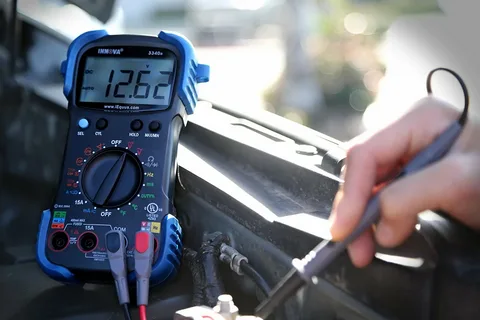A multimeter is one of the most essential tools for electricians, engineers, DIY enthusiasts, and technicians. Whether you’re troubleshooting a home appliance, working on a car, or building a circuit, a multimeter helps you measure key electrical values like voltage, current, and resistance. In this guide, we’ll explore what a multimeter is, how it works, its types, and tips for using it safely and effectively.
What is a Multimeter?
A multimeter, also known as a volt/ohm meter or VOM, is an electronic measuring instrument that combines several measurement functions in one unit. The most basic multimeters measure voltage (volts), current (amps), and resistance (ohms). More advanced models can also test continuity, diodes, capacitance, temperature, and even frequency.
Multimeters are commonly used to diagnose electrical problems in a wide variety of devices and systems, making them a versatile and indispensable tool.
Types of Multimeters
There are two main types of multimeters: analog and digital.
1. Analog Multimeter:
Analog multimeters use a needle and dial to display readings. They are less commonly used today but can still be useful for observing trends or fluctuating readings in a circuit.
2. Digital Multimeter (DMM):
Digital multimeters are the most popular type, offering precise and easy-to-read numeric displays. They come with additional features and often include auto-ranging capabilities, making them ideal for beginners and professionals alike.
Key Features of a Digital Multimeter
Modern digital multimeters offer a wide range of functions, including:
- Auto-ranging: Automatically selects the correct range for measurement.
- Backlit Display: Makes it easier to read in dark areas.
- Data Hold: Freezes the current reading on the screen.
- True RMS: Provides accurate readings for both sinusoidal and non-sinusoidal AC signals.
- Continuity Tester: Emits a sound if there is a complete circuit, useful for checking wires and connections.
These features make digital multimeters user-friendly, reliable, and suitable for a wide range of applications.
Common Uses of a Multimeter
A multimeter can be used in numerous scenarios:
- Testing batteries: Measure the voltage to check if a battery is still good.
- Checking outlets: Ensure household outlets are supplying the right voltage.
- Diagnosing appliances: Find faulty components in electronics and household devices.
- Automotive troubleshooting: Identify issues in your car’s electrical system.
- DIY electronics: Verify proper current and voltage in hobbyist projects.
Thanks to its versatility, a multimeter is a must-have tool in both professional toolkits and home garages.
How to Use a Multimeter Safely
While using a multimeter is generally safe, it’s important to follow some basic safety precautions:
- Read the manual: Understand the functions of your specific model.
- Check the settings: Always select the correct mode (voltage, current, resistance) before connecting the probes.
- Inspect the leads: Make sure the test leads are in good condition without any damage or exposed wires.
- Start with a higher range: When unsure of the expected value, begin with a higher range and work downwards.
- Avoid live circuits when measuring resistance: Resistance should only be measured in unpowered circuits.
Using a multimeter responsibly ensures accurate readings and prevents damage to the device or injury.
Choosing the Right Multimeter
When shopping for a multimeter, consider the following factors:
- Accuracy: Look for a multimeter with high accuracy if you’re working on sensitive electronics.
- Build quality: Durable casing and strong probes ensure longevity.
- Features: Decide which functions you need based on your intended use.
- Price: Entry-level models are affordable and great for beginners, while professionals may want higher-end tools.
Popular brands like Fluke, Klein Tools, and AstroAI are known for producing high-quality multimeters trusted by professionals worldwide.
Conclusion
A multimeter is a powerful tool that offers great utility across various electrical and electronic applications. Whether you’re a homeowner checking batteries, a mechanic troubleshooting a car, or an engineer working on complex circuits, a multimeter helps you diagnose and solve problems with precision.
Learning how to use a multimeter effectively can save you time, money, and frustration. With a little practice, it can become one of the most valuable tools in your toolbox. If you haven’t already added one to your kit, now is the perfect time to invest in this essential device.




